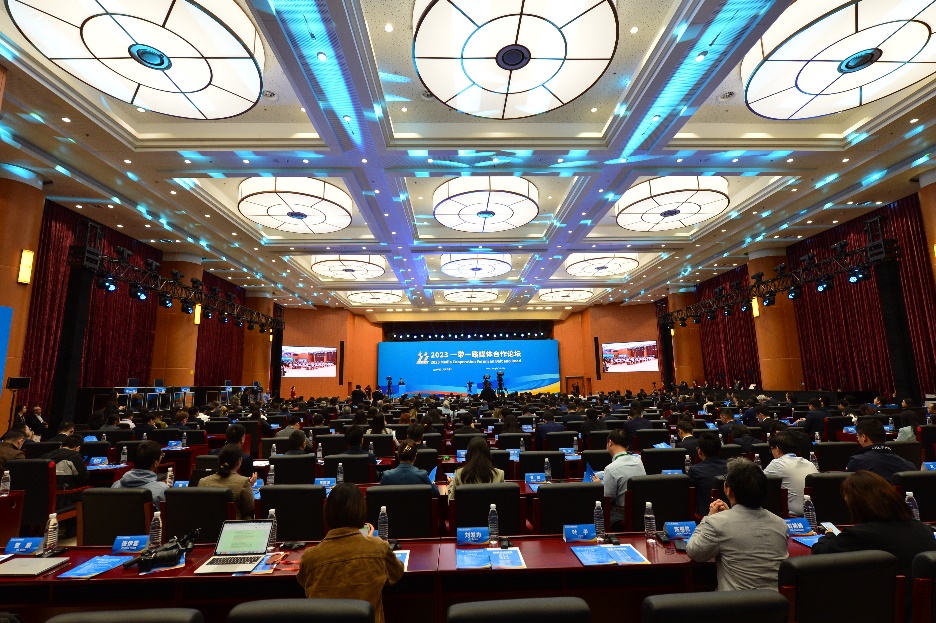




- BRNN
- BRI News
- BRNN News
- Database
Official Documents Polices and Regulations
Inter-government Documents International Cooperation BRI Countries
Business Guide Economic Data BRI Data
Trade
Investment Projects Latest projects
Cases - Content Pool

The 2023 Media Cooperation Forum on Belt and Road held in Beijing on Thursday Photo: Courtesy of the People's Daily
Facing numerous false, one-sided reports about the Belt and Road Initiative (BRI) from the Western media, officials and journalists from home and abroad proposed on Thursday that more on-site investigations are needed to explore the truth, so as to facilitate the high-quality development of the BRI.
The proposal was made at the 2023 Media Cooperation Forum on Belt and Road held in Beijing on Thursday, with its theme being "Strengthening Media Cooperation for a Brighter Shared Future." The forum was hosted by People's Daily, serving as a platform for high-level dialogue and cooperation among countries, regions, enterprises and media. Over 130 foreign media executives, senior editors and journalists from over 110 media outlets in 75 BRI partner countries participated in the forum.
"The BRI is a fascinating collection of stories that unfolds like a long-running series. Countless individuals are working tirelessly on the frontlines, and hundreds of millions of people are benefiting from it," Sun Haiyan, vice minister of the International Department of the Central Committee of the Communist Party of China, told the forum. "It is worth the media's investment and enthusiastic dedication to fully report on the BRI," she said.
Sun noted that there are too many false, one-sided and erroneous reports about the BRI from the Western media, and journalists from BRI partner countries need to conduct on-site visits and reports to reveal the truth. "Additionally, there are many touching stories about people's livelihoods that need to be told. If media outlets report such stories, it will not only attract more interest, but also build more understanding and support for the BRI," the official added.
Executive Director of the Center for the Promotion of the Belt and Road Initiative of Bosnia and Herzegovina Faruk Bori said that people in Bosnia watch a lot of TV, so he has communicated with the Chinese media to help create a weekly program for Bosnia's public national TV introducing Chinese culture.
Media workers from BRI countries were also encouraged to take data as an important driving force and to seize the historical opportunity of the information revolution.
"We should integrate big data into the entire process of planning, production, and dissemination of media reports," said Deputy Director of the Office of the Central Cyberspace Affairs Commission and Cyberspace Administration of China Niu Yibing. With China on Wednesday launching the Global Artificial Intelligence Governance Initiative, Niu added that international journalists should implement this initiative to better support the development of the media and enhance the communication effectiveness of the BRI.
Chinese President Xi Jinping on Wednesday announced eight major stepsthat China will take to support high-quality Belt and Road cooperation in a keynote speech at the opening ceremony of the third Belt and Road Forum for International Cooperation. Inspired by this, some foreign guests shared their views on the BRI with the Global Times at the media forum.
Vito Rosario Petrocelli, chairman of Istituto Italia BRICS, said that since the signing of the memorandum of understanding on BRI cooperation in 2019, China and Italy have achieved great cooperative results, despite some issues between the two countries.
The construction of the BRI involves not only infrastructure projects such as railways and hospitals, but also development initiatives, the official said. "In the future, jointly building the BRI will bring the people of all participating countries closer together," he added.
Business News Editor of the Vientiane Times Manichanh Pasivongxay said that for Laos, the BRI creates greater opportunities for economic development, helping to transform the country from a landlocked to a land-linked country.
"What we can see in reality is the construction of a high-speed railway, which is part of the BRI project to connect Southwest China's Yunnan Province to Vientiane, the capital city of Laos. It provides good facilities for transportation between the two countries," the editor added.

Tel:86-10-65368972, 86-10-65369967